by Lauren Bourdages, Head Editor, INALJ Ontario
Online vs. F2F Programs: Why Employers Need to Stop Stereotyping Grads Based on Their School
 Lately I have seen a trend in the Hiring Librarians survey responses, a handful of hiring managers have, recently, stated in one way or another that they have a bias against students who have completed their library education entirely online. This isn’t the first time I have heard about this stereotype, I’ve had people I know tell me in face to face conversation that they would never do an entirely online program and they don’t think anyone else ever should either, because they don’t see the value there, they don’t get them.
Lately I have seen a trend in the Hiring Librarians survey responses, a handful of hiring managers have, recently, stated in one way or another that they have a bias against students who have completed their library education entirely online. This isn’t the first time I have heard about this stereotype, I’ve had people I know tell me in face to face conversation that they would never do an entirely online program and they don’t think anyone else ever should either, because they don’t see the value there, they don’t get them.
Have a look at some of the additional background reading that exists on this topic:
As Online Degrees Become More Prevalent, Questions Linger
Stats and Graphs: Biases Against Online Library School (This one is a GREAT primer!)
Noticing this trend was what inspired me to dedicate the June 30 2014 edition of #inaljchat to exploring this debate. I wanted to start to dig into how pervasive a bias this is. Just as the “sexy librarian” is a stereotype that we must debunk, so to must we fight against the stereotype that all online degree programs are bad/worthless/not as good as face to face (F2F) and therefore all graduates of such programs must somehow be lesser library professionals than their counterparts who took their degrees in the traditional F2F environment.
As a graduate of an online library technician diploma program who is considering one day doing an online MLIS, who also has 2 degrees from F2F programs (a BA and a BEd) I have heard every single imaginable argument for and against online education. Here’s the thing though, and this is one of the first things they teach you in teacher’s college so I am putting it in bold and capitals for you: EVERY STUDENT DOES NOT LEARN THE BEST THE SAME WAY. EVERY LEARNING STYLE DOES NOT SUIT EVERY STUDENT IN EVERY CIRCUMSTANCE. What works for one student may not work for the other 1, 10, 20 or even another 15,000. That is the first and most important argument I can make FOR online learning. Being a product of both traditional F2F instruction, and contemporary online instruction, I can honestly say, I prefer, and indeed, thrive more in the online learning environment. I know however that this is a statement that is not true of all students so would would do we generalise? Why would we make assumptions?
Because that is what people do. People stereotype, as the Evil HR Lady, Suzanne Lucas, reminded me early on June 30.
So what do we do? How do we stop the bias? Well let’s start by exploring the bias. What are some of the arguments against online learning?
The 3 overarching categories of complaints I have seen are:
– Online learning doesn’t allow for students to create professional networks and make connections
– Online learning is a lower quality/caliber of learning
– Online learning doesn’t allow for opportunities to get experience and put learning into practice
Now let’s look at these assumptions more closely, and think about why it’s wrong to generalise vs. looking at the individual.
Not every student in a F2F program will come out a superstar, and not every person who does an online program is an inexperienced underachiever. To make that assumption is insulting and disrespectful to the rock stars of both groups who worked have worked hard to get where they are.
Let’s actually set up some examples so you can see what I mean. You are hiring for a User Experience Librarian position in an Academic Library. You have 4 potential hires (who are all totally fake and completely made up by me, yay!):
Candidate 1: Apollo Stark – Graduated middle of his class from a traditional F2F program. Has completed 3 internships, none directly in User Experience, but one was in an Academic Library, and he has done user experience and coding course work. He is an active ALA participant, and was heavily involved in the student groups within his program.
Candidate 2: Bertha Baggins – Graduated from a F2F program. Has completed 2 internships, one in User Experience and has user experience and coding course work experience. Otherwise has not been active in the industry aside from paying membership dues to ALA.
Candidate 3: Cimorene Potter – Graduated top of her class from a 100% online program. Worked part-time, in a paraprofessional role while doing her program. Has completed 2 internships, 1 directly in User Experience. She is actively involved in ALA serving on committees and has presented poster sessions at ALA Annual. She also volunteers virtually with multiple LIS related groups.
Candidate 4: Datak Kirk- Graduated from a 100% online program. Works part-time in a non-LIS industry role. Has 2 internships, 1 related to User Experience. Otherwise has not been actively involved in the industry.
You look at these 4 candidates and you’ve got the 2 levels in each group. 1 and 3 represent the rockstars, while 2 and 4 represent the average. The different between 1 and 3 and 2 and 4 is not where or how they went to school, it’s the type of person they are and the initiative that they took.
Why it doesn’t matter where or how you went to school:
1. If you’re passionate about the material you are learning, you’re going to do well…
That’s a given. The rockstars are the people who are passionate about what they are studying. They are engaged and involved and want to put into practice the theory that they are learning. If Apollo is an audio learning, he’s going to learn better in a traditional classroom model than Cimorene, if she’s a visual learner. Put them in an online class though were a lot of the learning is done through reading, and Cimorene will do better. Regardless of the learning environment, they are both the type of person who will go out and apply what they are learning in any way they are able to. That’s what sets them apart from Bertha and Datak.
2. Some people don’t make use of opportunities that are handed to them, and some make their own…
One of the biggest things I hear against graduates of online learners is that they don’t have people skills, they don’t have networks, and they are just isolated by being online. Sure it’s EASIER to become isolated online, but it’s just as possible to end up with poor people skills, no network, and no connections after going through a F2F program as well. Once again, it all comes down to the individual, stop making generalisations about entire groups of people. With some people, it really doesn’t matter how many opportunities you lay at their feet, they aren’t going to take them. Other people will make the most of what they have and will go out there and make their own opportunities. For example, a F2F grad might have an extensive network…in the city where they graduated…that particular network might not be of any help if the grad has to move away to get a job. On the other hand the equally eager and engaged online grad might have taken the time to cultivate not only a local network but also a regional/state/provincial, national, and even international network of professional connections.
3. Everyone’s circumstances are different, if you don’t know theirs don’t assume, you know what happens to people who assume…
Everyone chooses the program they choose for different reasons. Those reasons may be financial, logistical, geographical, or as I’ve said countless times now, based on learning style/preference. You don’t want someone to judge your choices based on these factors, so why do you insist on judging others this way? For some people F2F just really isn’t an accessible reality. Who are you to tell them that they are somehow less worthy just because of the program they graduated from? What if they were going through an online program because they had to work a full-time day job to support their ailing parent, or their family, and the library industry was their passion? What if our fake candidate Cimorene chose to do an online only degree because she couldn’t afford to move and there was no F2F option within commuting distance? (Or even if there were what if she had a valid reason for not being able to commute?) Everyone has these biases, but the point is you have to look past those biases and see the individual for their worth, not the worth you perceive them as having through your bias.
4. We are a 21st century learning oriented industry interested in teaching information literacy…but we frown on people who have acquired their degree through a decidedly 21st century method?
I’m sorry that just seems incredibly contradictory. People who have learned successfully in this model have an intimate knowledge of the model and how to make it work effectively, shouldn’t that make them desirable candidates?
Let’s look at some of the points that came up in the #inaljchat on this topic (or you can read the entire transcript here):
We had some great discussion and a lot of back and forth between those for and those against online LIS education. Let’s keep the conversation going now. We need to advocate for PEOPLE NOT PROGRAMS. We need to let hiring managers know that it is not okay to generalise us based on where and how we went to school, but by looking at how hard we have worked and what we have accomplished.
Share your tips for online learners in the comments, how can they succeed in their online programs and defy this stereotype. Share your stories so we can help hiring managers see that not ALL online graduates are what they think.
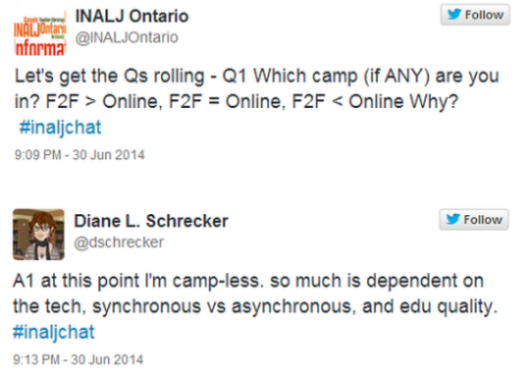
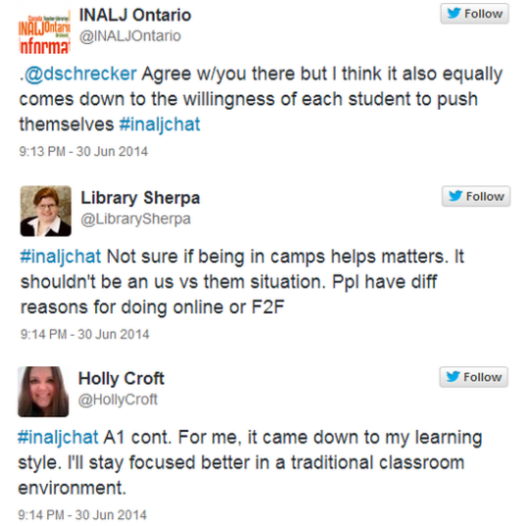
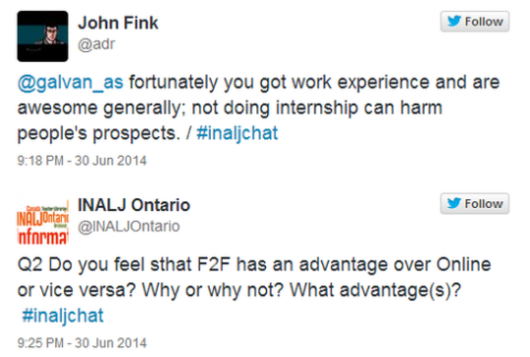
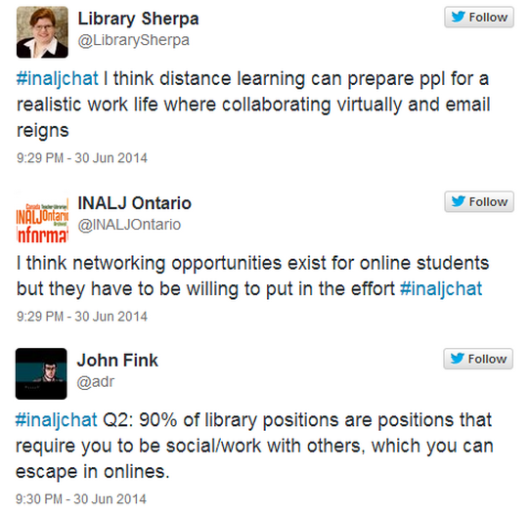
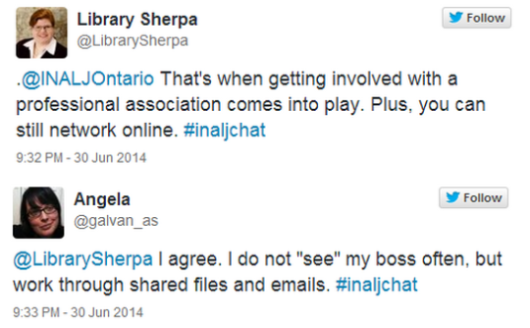
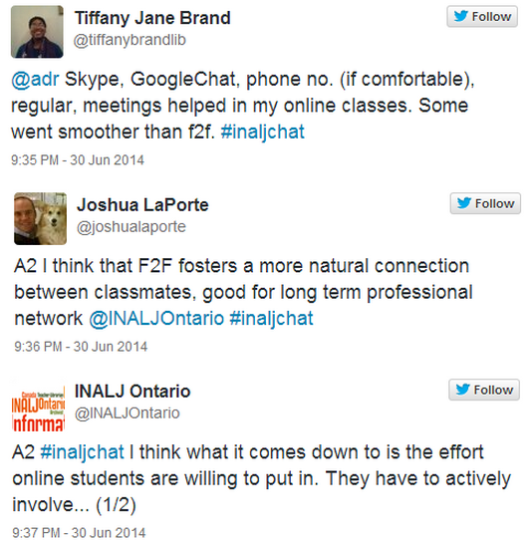
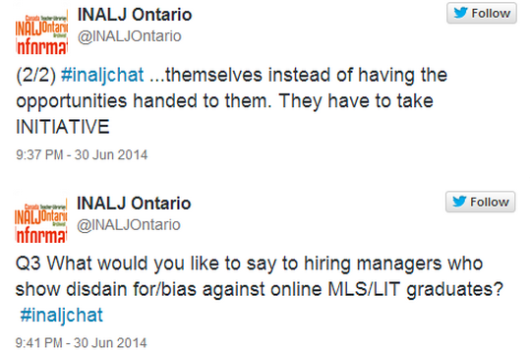
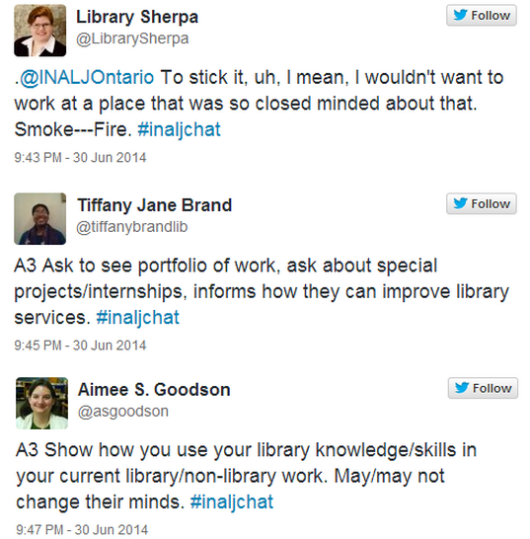
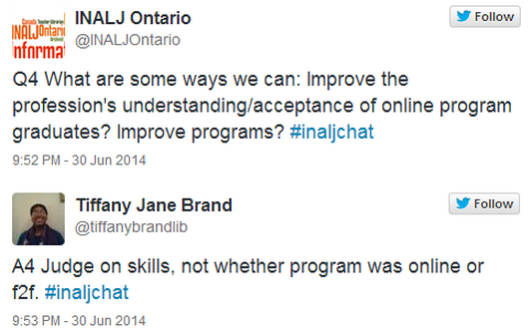
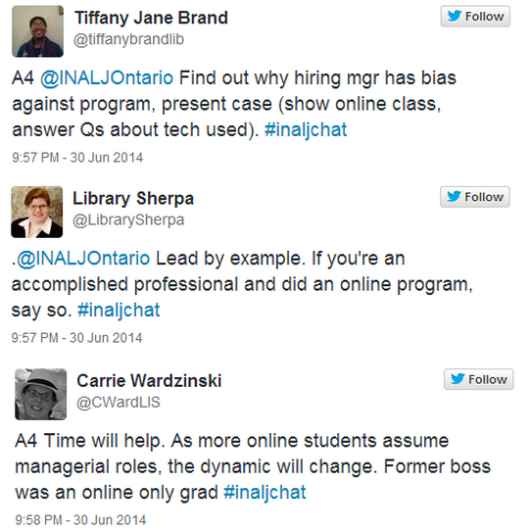
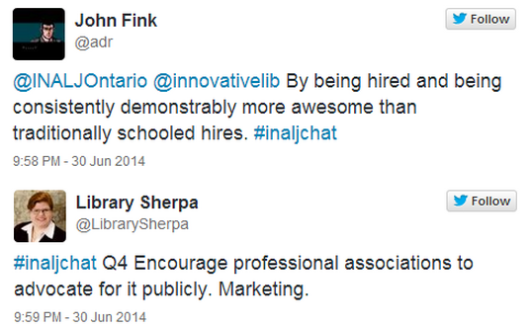
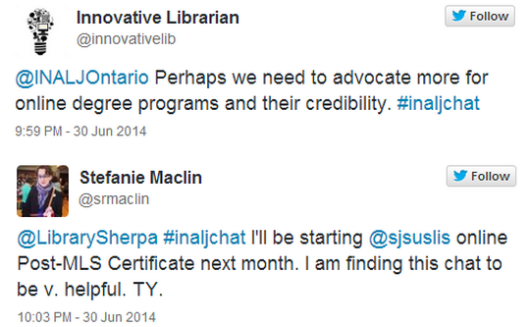
4 comments for “Online vs. F2F Programs: Why Employers Need to Stop Stereotyping Grads Based on Their School”